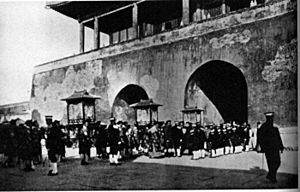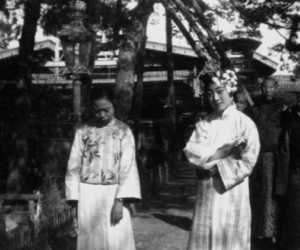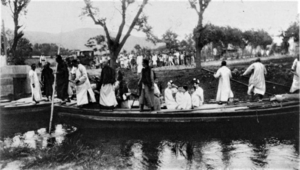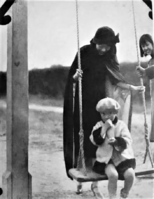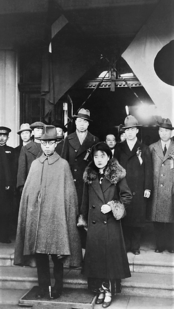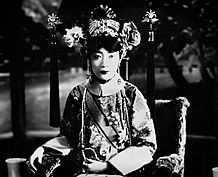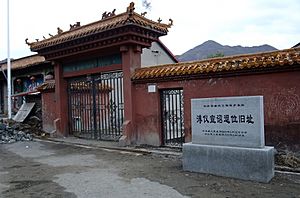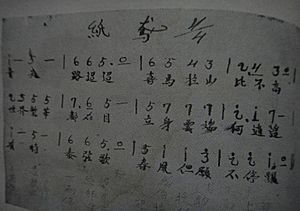Wanrong facts for kids
Quick facts for kids Wanrong |
|||||||||
|---|---|---|---|---|---|---|---|---|---|
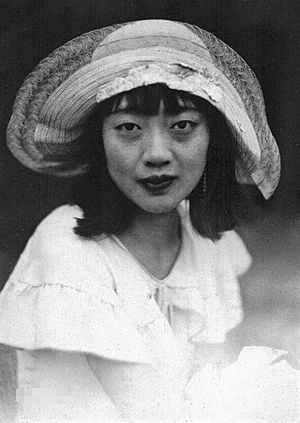
Wanrong c. 1926-1931
|
|||||||||
| Nominal empress consort of the Qing dynasty | |||||||||
| Tenure | 30 November 1922 – 5 November 1924 | ||||||||
| Empress consort of Manchukuo | |||||||||
| Tenure | 1 March 1934 – 17 August 1945 | ||||||||
| Born | 13 November 1906 Beijing, Qing Dynasty |
||||||||
| Died | 20 June 1946 (aged 39) Yanji, Jilin, China |
||||||||
| Spouse | |||||||||
|
|||||||||
| House | Gobulo (郭布羅) | ||||||||
| Father | Rongyuan | ||||||||
| Mother | Aisin-Gioro Hengxin | ||||||||
| Wanrong | |||||||||||||
|---|---|---|---|---|---|---|---|---|---|---|---|---|---|
| Chinese | 婉容 | ||||||||||||
|
|||||||||||||
| Xuantong Empress (posthumous name) |
|||||||||||||
| Chinese | 宣統皇后 | ||||||||||||
|
|||||||||||||
| Muhong (courtesy name) |
|||||||||||||
| Traditional Chinese | 慕鴻 | ||||||||||||
| Simplified Chinese | 慕鸿 | ||||||||||||
| Literal meaning | Admirable Swan | ||||||||||||
|
|||||||||||||
| Zhilian (art name) |
|||||||||||||
| Traditional Chinese | 植蓮 | ||||||||||||
| Simplified Chinese | 植莲 | ||||||||||||
| Literal meaning | Lotus Plant | ||||||||||||
|
|||||||||||||
Wanrong (Chinese: 婉容; 13 November 1906 – 20 June 1946) was the last empress of China. She was the wife of Puyi, who was the final emperor of the Qing dynasty. She was sometimes called the "Xuantong Empress," which referred to Puyi's special title.
Wanrong was the empress of the former Qing dynasty from her marriage in 1922 until the royal family left the Forbidden City in 1924. Later, she became the empress of Manchukuo, a state in northeastern China that was controlled by Japan. This was from 1934 until 1945, near the end of World War II. After her death, she was given the special title Empress Xiaokemin.
In 1945, during the Soviet invasion of Manchuria, Wanrong was captured by Chinese soldiers. She was moved to different places and then held in a prison camp in Yanji, Jilin. She passed away in prison in June 1946. Her body was never found. In 2006, her younger brother, Runqi, held a special ceremony for her at the Western Qing tombs.
Contents
Understanding Wanrong's Names
Wanrong's full birth name was Gobulo Wanrong (郭布羅·婉容). In Manchu culture, people were usually known by their given names only, so she was simply called Wanrong.
She also had a special "courtesy name" called Muhong (慕鴻), which means "Admirable Swan." Her "art name" was Zhilian, meaning "Lotus Plant." Wanrong even chose a Western name for herself, Elizabeth. She was inspired by Elizabeth I of England.
Her Family and Early Life
Wanrong was born into the Gobulo clan, which was part of the Manchu Plain White Banner. Her family had Daur ancestry.
Her father, Rongyuan (榮源), worked for the Qing Dynasty government. When Wanrong became empress, he worked for the royal family. Wanrong's birth mother died when Wanrong was only two years old. Her stepmother, Aisin-Gioro Hengxin (恒馨), raised her. Wanrong had a brother named Runliang (潤良) and a half-brother named Runqi (潤麒). Her family lived in a traditional house in Beijing.
Unlike many fathers at that time, Rongyuan believed that girls and boys should have the same education. So, Wanrong was taught just like her brothers. She even went to an American missionary school in Tianjin.
Her Marriage to Puyi
In 1912, the Qing dynasty ended, and the Republic of China began. This meant thousands of years of emperors ruling China were over. However, the former royal family was still treated with respect. Puyi, the last emperor, was allowed to have a traditional imperial wedding in the Forbidden City.
Puyi was 16 years old when he had to choose a wife from photographs. He first picked a 12-year-old girl named Wenxiu. But the royal family suggested Wanrong instead, as she was about the same age and from a similar background. Since Puyi had already chosen Wenxiu, they decided he would marry both Wanrong and Wenxiu. Wanrong would be his main wife, and Wenxiu would be his secondary wife. This was a Manchu tradition.
After Wanrong was chosen, she moved back to Beijing to get ready for the wedding. Palace servants called eunuchs were sent to her home to prepare her. Wanrong's brother, Runqi, said she was unhappy about marrying someone she had never met. But she eventually agreed.
Wanrong's wedding included three traditional ceremonies. There was a ceremony for gifts from Puyi, a ceremony to announce the wedding date, and a ceremony to give Wanrong her title as empress. On her wedding day, she followed Manchu tradition by stepping over a fire, a saddle, and an apple.
An American writer named Richard Halliburton was there. He described the wedding procession moving through the streets of Peking (now Beijing) very early in the morning. He saw many flags, lanterns, and princes on horseback. The bride's special sedan chair, carried by sixteen noblemen, came last. He wondered how Wanrong felt, knowing she was going to live in the palace.
Puyi sat on his special throne, and people bowed to him. Later, in Wanrong's new home, she bowed to him six times. Wanrong wore a mask, as was the custom for night weddings. Puyi later said he was curious to see what she looked like.
After the wedding, Wanrong lived in the Palace of Gathered Elegance. Puyi continued to live in a different part of the palace.
Life in the Forbidden City
As the empress of China, Wanrong had many servants, including eunuchs and maids. They took care of her every need. She had her own kitchen and a tailor who made new dresses for her almost every day. When she bathed, her maids would help her.
Her personal eunuch, Sun Yaoting, said that even though Wanrong could sometimes be moody, she was usually kind to her servants. She would even offer him food. Her brother, Runqi, remembered Wanrong telling him off for being rude to a servant. However, she would also send away any servant who upset her.
Wanrong loved to read, listen to jazz music, and eat Western food. She enjoyed playing the piano, writing in English, and taking photos. Her brother said she was old-fashioned, but she was also more open to Western ideas than Puyi. She had grown up in a part of Tianjin influenced by French culture. She even taught Puyi how to eat Western food with a knife and fork.
An article in Time magazine in 1924 mentioned that Puyi and Wanrong had adopted Western names. Wanrong's was Elizabeth. The empress also wrote poems, composed at least one song, painted, and wrote letters that sometimes included English words.
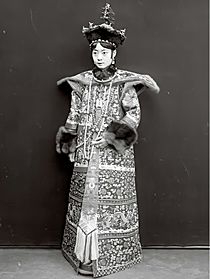
Even though Wanrong was the empress and had a higher position than Puyi's other wife, Wenxiu, she saw Wenxiu as a rival. Wanrong sometimes wrote letters teasing Wenxiu, who lived nearby.
Wanrong's tutor, Isabel Ingram, who taught her English, noticed that Wanrong could focus for hours on tasks like studying or playing the organ. Another teacher, Hu Siyuan, said Wanrong was "wise and eager to learn, quick-witted and inquisitive." He believed she would have been a great help to the emperor if she had continued her studies.
Puyi, Wanrong, and Wenxiu sometimes left the Forbidden City with their staff. They visited relatives or went sightseeing. Newspapers in 1923 reported on these trips. They visited the Summer Palace and had tea with Puyi's English tutor, Reginald Fleming Johnston. Time magazine said Elizabeth (Wanrong) was with Miss Isabel Ingram, and Puyi enjoyed speaking English.
When she was around 18 or 19, Wanrong still enjoyed playing games with her maids and eunuchs. She would play games like "drop the handkerchief" late into the evening. She often felt lonely because she had few visitors apart from her servants.
Sun Yaoting, Wanrong's personal eunuch, said Puyi rarely stayed the night with Wanrong. Sun said Wanrong often left her door open at night, perhaps because of loneliness. When Puyi did visit, the door would be closed.
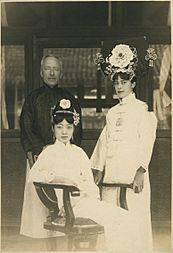
Sun also remembered Puyi bringing a German-made bicycle for Wanrong to learn to ride. Puyi would visit her every day during this time. Wanrong was brave and even stood up while riding a swing.
Wanrong sometimes sent her staff to donate money to poor people outside the Forbidden City. In December 1923, she was praised for donating 600 yuan to a charity.
Life in Tianjin
In October 1924, a military leader named Feng Yuxiang took control of Beijing. He forced Puyi and his family to leave the Forbidden City on November 5. Wanrong's tutor, Ingram, described seeing soldiers outside and felt it was the end of "beautiful China."
Puyi, Wanrong, and Wenxiu first stayed at Puyi's father's house in Beijing. Puyi then secretly went to the Japanese Legation in Beijing. Later, he moved to the Japanese area in Tianjin in February 1925. Wanrong and Wenxiu followed him. They lived in the Zhang Garden and later moved to the Quiet Garden Villa in Tianjin.
In Tianjin, they lived a more peaceful life and enjoyed public and social activities.
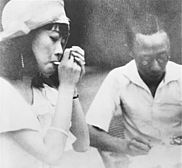
Wanrong found many ways to have fun in Tianjin. She went to the theater, danced, skated, rode horses, played sports, and shopped. She loved to shop, often using it to get Puyi's attention. Puyi often took Wanrong to the Xinming Theater to watch operas.
Wanrong's friend, Shuh Yun, remembered playing mahjong tiles with her. Shuh Yun said they went on sightseeing trips. Wanrong mostly enjoyed watching activities like dancing or horse riding.
Puyi often showed more attention to Wanrong, which caused problems with Wenxiu. Eventually, Wenxiu divorced Puyi in 1931.
When big floods happened in China in 1931, Wanrong donated a pearl necklace to help those affected.
Wanrong's Diary Entries in Tianjin
Wanrong kept a diary in Tianjin. She wrote about Wenxiu, her own health issues, and how Puyi sometimes ignored her.
On May 2, 1931, she wrote about her feelings.
In her diary entry from April 30, 1931, Wanrong mentioned she had been seriously ill three times during her seven years in Tianjin. She also wrote about having "panasthenia," which is a type of nervous weakness.
On October 1, 1931, she wrote about Wenxiu asking for a divorce from Puyi. Wanrong asked Puyi if the rumors were true, and he said they were just rumors. Wanrong also wrote that she knew if Puyi was living alone or seeing Wenxiu.
Puyi later wrote that he felt "great resentment" for Wanrong after Wenxiu left. He said he neglected Wanrong so much that she stopped telling him her feelings.
Empress of Manchukuo
In late 1931, a Japanese agent named Yoshiko Kawashima helped Wanrong travel from Tianjin to Dalian and then to Port Arthur (now Lüshun). She was going to meet Puyi, who had agreed to lead a new state called Manchukuo in northeastern China. Japan had created Manchukuo. Puyi hoped to bring back the Qing dynasty.
Wanrong did not like the Japanese and was against Puyi's plan to go to Manchuria. For a moment, Puyi hesitated. However, Yoshiko Kawashima, who was very pro-Japanese, visited Puyi to change his mind. Wanrong eventually moved secretly to Manchukuo.
Wanrong arrived in Dalian on November 28, 1931. At first, the Japanese military did not allow Puyi and Wanrong to stay together. Wanrong's requests to visit Puyi were turned down. A guard for Puyi said there were rumors that the emperor had been killed or was under house arrest. Wanrong was eventually allowed to visit Puyi in Lushun. The Japanese military might have worried that Puyi could be influenced by others at such an important time. Wanrong stayed in Lushun for a few months before moving to Hsinking (Changchun).
In Hsinking, the Japanese closely watched Wanrong. She began to dislike them and secretly tried to escape twice. A diplomat named Wellington Koo wrote in his memoirs that a man claiming to be sent by Wanrong asked for his help to escape from Hsinking. Wanrong felt miserable because Japanese attendants watched her every move. She knew Puyi could not escape, but she hoped to help him if she could. In another incident in 1933, Wanrong asked the wife of a Manchukuo official for help, but her plan failed again. Frustrated, Wanrong was heard saying, "Why can everyone else be free, but I can't be free?"
On March 1, 1934, the Japanese government declared Puyi the Emperor of Manchukuo and Wanrong his Empress. They lived in the Weihuang Palace, which was a former tax office turned into a temporary palace. Besides Puyi's coronation in 1934, Wanrong made only one other public appearance as Empress of Manchukuo. This was in June 1934, when Prince Chichibu visited Manchukuo from Japan. She also made smaller public appearances, like when she presented flowers during an official visit in September 1939.
According to records from 1934, Wanrong had 27 new traditional Chinese dresses made in one year. She also learned drawing and music, such as playing the piano. She enjoyed playing chess and tennis. Her teacher, Cui Huimei, remembered Wanrong teaching them a sad song, the national anthem of the Qing Dynasty.
In November 1934, The New York Times reported that Empress Yueh Hua (Wanrong's pen name) would leave the capital due to a "nervous illness."
Puyi became a strong Buddhist in Manchukuo. He read many books about it and became very superstitious. He would not even let his staff kill a single fly. Puyi wrote that Wanrong became so caught up in these superstitions that she would blink and spit, as if she were mentally unwell.
Imprisonment and Death
In August 1945, during the Soviet invasion of Manchuria, Puyi tried to escape from Manchukuo. He was worried his family and staff would be arrested. Puyi, Wanrong, and their group traveled by train to Dalizi. From there, Puyi took a plane to Mukden, leaving Wanrong, his concubine Li Yuqin, and other family members behind in Dalizi. Wanrong and her sister-in-law Hiro Saga tried to escape to Korea but were captured by Chinese soldiers in January 1946.
Soviet officers arrived in Dalizi and briefly met Li Yuqin and Wanrong before leaving them.
Wanrong and her group later moved to Linjian county to spend the winter in a hotel because it was very cold. Li Yuqin visited Wanrong, who was very weak. Li Yuqin recalled that Wanrong made two noises, "Heh! heh!", and her eyes looked panicked and anxious.
Eventually, Chinese soldiers took them back to Changchun. Li Yuqin was later taken home by her family. But Wanrong had nowhere to go. Her father had been captured, and her brother had left her. She had to move around with the army. When the military left Changchun, they took Wanrong with them.
On June 10, an order was given to move Wanrong and her group to other cities. Wanrong was too weak to walk. The person in charge of the prison thought it would be best to leave her, in case she died during the journey. Wanrong spent her last days without any family or friends.
After Hiro Saga was separated from her, Wanrong died in prison at the age of 39 on June 20, 1946, in Yanji, Jilin province. Her burial place is unknown.
Three years later, Puyi learned from a letter that Wanrong had died. He did not show much emotion. Puyi wrote in his memoir that Wanrong's life would be hard for a modern Chinese girl to understand. He felt that if she had divorced him in Tianjin, like Wenxiu did, she might have had a different fate. But Wanrong cared deeply about her position as empress, even if it meant being a wife only in name.
Cenotaph
On October 23, 2006, Wanrong's younger brother, Runqi, held a special burial ceremony for her at the Western Qing tombs. A photo owned by Runqi was buried there. A hand mirror that belonged to Wanrong was chosen to be placed in a museum.
A Song by Wanrong
Wanrong wrote a song called "Paper Kite."
青天 路迢迢 喜馬拉山 比不高
世界繁華 都在目 立身雲端 何逍遙
有時 奏弦歌 春風但願 不停飄
全憑 一線牽 風伯扶住 向上飛
莫教雨師 來迎接 竹當身體 紙做衣
偶逢 春朋友 語道你高 我還低
Under the blue sky, an endless journey lays before me, even the Himalayas seems shorter from where I stand
I can see the entire bustling world, yet standing atop the clouds, how can I be truly free and unfettered?
Sometimes I sing to the melody, and I wish the winds of spring will not stop, so I can continue to fly
Only connected through one thin thread, flying upwards thanks to help from the wind god
Don't call the rains to come welcome me, bamboo as the body and paper as clothes
Sometimes in spring I happened to meet friends (along the way), that told me I was high and they were low.
Awards and Honours
| Styles of Xuantong Empress |
|
|---|---|
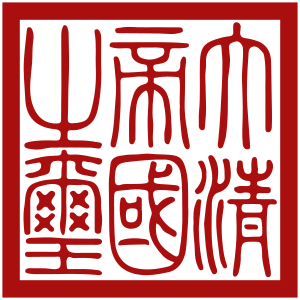 |
|
| Reference style | Her Imperial Majesty |
| Spoken style | Your Imperial Majesty |
| Alternative style | Empress Consort (Titular) |
- Grand Order of the Orchid Blossom (Manchukuo, April 19, 1934)
- Order of the Precious Crown (Japan, June 6, 1934)
Her Siblings
Wanrong had two brothers. Her older brother, Runliang (潤良; 1904–1925), married Puyi's first sister, Yunying (韞媖; 1909–1925). They did not have any children. Wanrong's younger brother, Runqi (潤麒; 1912–2007), married Puyi's third sister, Yunying (韞穎; 1913–1992). They had two sons and one daughter.
Wanrong in Movies
Wanrong was played by actress Joan Chen in the 1987 film The Last Emperor.
See also
 In Spanish: Wan Rong para niños
In Spanish: Wan Rong para niños
- Ranks of imperial consorts in the Qing Dynasty
- Royal and noble ranks of the Qing dynasty
 | Delilah Pierce |
 | Gordon Parks |
 | Augusta Savage |
 | Charles Ethan Porter |


